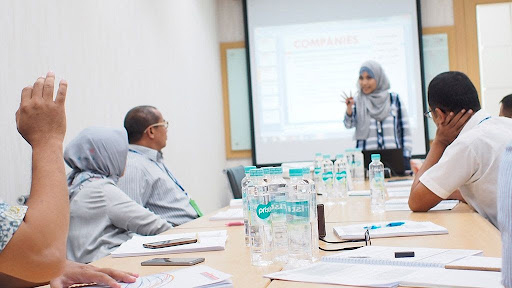Imagine in the middle of your presentation someone asked you tough questions. It is good to be honest but never say “I don’t know” (during a presentation). You should act like you are the expert on the topic, even though as humans, we could never expert a topic fully. It is normal to make errors, what we need to do is to solve them as fast as we can.
When questions get tough, you need to act quickly. No matter how nervous you are, do not freeze. Use these tips to face the unknown during your presentation:
Ask Back
When you are facing a difficult question, your brain will assume that if you don’t know the answer, then nobody knows. That assumption is not true. It is just the illusion your brain makes because you are under pressure. Good news! Somebody in the audience might know the answer . Therefore, never be shy to toss the question back to the them .
If one of the audiences voluntarily helped you, don’t be passive. You need to listen to what they say . When they are finished, you can add your own opinion, emphasize some points, or close it beautifully with a conclusion.
Call an Expert
This tip is used to answer a very specific question that is out of your hands because you are not the master of the field. For example, the answer requires some insights in digital marketing but your expertise is account executive. Yes, even though you are not an expert in the relevant field, you still need to answer the question. What a relief that you don’t have to answer directly. You can ask one of your colleagues to answer the question.
However, we don’t want to make it obvious that we are asking for help. So first, you can give your opinion but keep it general. Then, ask the expert politely, you could say, “Martha, you are the expert of digital marketing. Do you have anything to add?”
Make a List
Imagine it’s a question and answer time, you said, “Does anybody have a question?” and five people raised their hands. You can make a list of questions and write them down on the whiteboard or any media you have. While you are writing, you can think or prepare the answer. If the questions are all hard, you can ask the first two to three questions, after that announce a fifteen-minute toilet break. During the break, you can sit in a quiet place and work on the answers.
Use the Magic Word: We’ll Get Back to You
Sometimes, questions require difficult answers with a long explanation. When you face this question, you don’t need to give the answer right here, right now. You can always say, “That’s a good question, we’ll get back to you.” Don’t stop there. Ask them to give their name and email to the event’s committee. You will get more time to give them the answer with better elaboration, the rest of the audience won’t be bored, and the questioner will get their answer.



